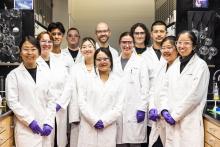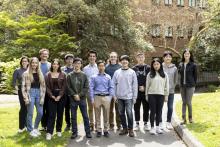We are pleased to announce that Assistant Professor Dianne Xiao has been promoted to associate professor with tenure and Associate Professors Matthew Bush, Dan Fu, and Jesse Zalatan have been promoted to professor. These promotions are effective September 16, 2025.
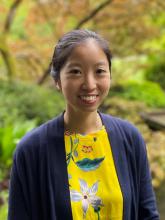
Dianne Xiao
Associate Professor
Professor Dianne Xiao’s research program designs new porous materials to address unsolved challenges in clean energy and chemical sustainability. These include developing new porous adsorbents that can use renewable electricity to drive chemical processes, as well as new porous catalysts that can convert sustainable feedstocks into useful products.
“Porous materials are the bedrock of industrial heterogeneous catalysis and chemical separations. Many of the chemicals we use in our daily lives have, at some point, been purified or chemically transformed within nano-sized pores,” Xiao shared in a statement earlier this spring upon her selection as a Sloan Fellow. “Going forward, new breakthroughs in porous materials synthesis are needed to harness renewable energy sources and chemical feedstocks. With the support of this [Sloan Fellowship] award, along with the collaborative ecosystem at the UW, we hope to realize these synthetic breakthroughs faster, better and more cheaply.”
Prof. Xiao is a recipient of the Sloan Research Fellowship (2025), Camille Dreyfus Teacher-Scholar Award (2024), Packard Fellowship (2022), Beckman Young Investigator Award (2022), NSF Career Award (2022), and DOE Early Career Award (2021).
To learn more about Professor Xiao and her research, please visit her faculty page and research group website.
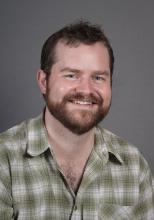
Matthew Bush
Professor
The Bush Lab develops and applies cutting-edge mass spectrometry (MS) technologies to understand the molecular biophysics of biomedically important proteins, with particular focus on "undruggable" targets that have proven difficult to characterize using conventional methods. Through a multidisciplinary approach integrating biophysics, analytical chemistry, and data science, the lab investigates a diverse range of proteins with particular emphasis on those involved in protein homeostasis. The lab's expertise centers on native MS for analyzing intact noncovalent complexes and ion mobility for separating ions based on size, shape, and charge. Recent advances include structural proteomics approaches to identify protein fragments and degrons recognized by E3 ubiquitin ligases, as well as crosslinking MS to map interactions of intrinsically disordered proteins. These complementary methodologies support the lab's overarching mission to develop fast, sensitive, and broadly applicable technologies that enable quantitative analysis of how proteome quaternary organization and structure respond to disease, cellular stress, and therapeutic interventions, ultimately advancing the development of innovative therapies for critical unmet medical needs.
Prof. Bush joined the chemistry faculty at the University of Washington in 2011, where he is also a member of the Department of Biochemistry, the Biological Physics, Structure and Design Program, the eScience Institute, and the Healthy Aging and Longevity Research Institute. He is the recipient of the Arthur F. Findeis Award for Achievements by a Young Analytical Scientist (2017), Sloan Research Fellowship (2014), Eli Lilly and Company Young Investigator Award in Analytical Chemistry (2014), and the Research Award from the American Society for Mass Spectrometry (2013).
To learn more about Professor Bush and his research, please visit his faculty page and research group website.
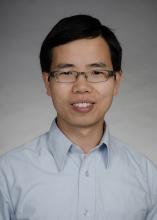
Dan Fu
Professor
Professor Dan Fu’s research program focuses on the development of precision chemical and functional measurement tools to study living biological systems and address challenging biomedical problems. Leveraging recent advances in lasers, ultrafast spectroscopy, and optical imaging, the Fu group constructs state-of-the-art multimodal microscopes that enable noninvasive imaging of previously inaccessible biomolecules or biomarkers at high spatial and temporal resolution in living cells, tissues, and animals. Combining these novel measurements with new machine learning methods optimized for chemical imaging data, the Fu lab explores the cellular mechanism of many diseases (e.g., cancer, metabolic diseases, neurodegenerative diseases), develops new early disease diagnosis tools, and improves high-content drug screening.
Fu is the co-director of the Master of Science in Applied Chemical Science & Technology program and a member of the UW Biological Physics, Structure & Design program and the Fred Hutchinson/UW Cancer Consortium. His research awards and honors include the Beckman Young Investigator Award, the NSF CAREER Award, the NIH Maximizing Investigators’ Research Award (MIRA), and the Eli Lilly Young Investigator Award.
To learn more about Professor Fu and his research, please visit his faculty page and research group website.

Jesse Zalatan
Professor
The Zalatan research group seeks to understand and engineer biochemical networks involved in cell signaling, biosynthesis, and genome regulation. Major research efforts from the group have focused on specificity mechanisms in human cell signaling networks and metabolic engineering in bacteria. Additional projects include engineering biosynthetic enzymes, developing methods to regulate human gene expression, and engineering bacteria as live cell therapeutics to treat cancer.
Prof. Zalatan joined the chemistry faculty at the University of Washington in 2014, where he is also affiliated with the Chemical Engineering department, the Molecular Engineering and Sciences Institute, the UW Center for Synthetic Biology, and the Biological Physics, Structure, and Design program. Outside of UW, Prof. Zalatan is an active member of the Engineering Biology Research Consortium. The Zalatan research group gratefully acknowledges support for basic research from NIH, NSF, DOE, the Ion-ARPA Initiative, and the Burroughs Wellcome Fund.
To learn more about Professor Zalatan and his research, please visit his faculty page and research group website.
